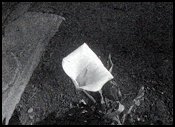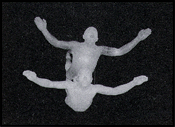When that I was and a little tiny boy,
With hey, ho, the wind and the rain,
A foolish thing was but a toy,
For the rain it raineth every day.
But when I came to man's estate,
With hey, ho, . . .
'Gainst knaves and thieves men shut their gate
For the rain, . . .
But when I came, alas! to wive,
With hey, ho, . . .
By swaggering could I never thrive,
For the rain, . . .
But when I came unto my beds,
With hey, ho, . . .
With toss-pots still had drunken heads,
For the rain, . . .
A great while ago the world begun,
With hey, ho, . . .
But that's all one, our play is done.
And we'll strive to please you every day.
This poem is in the public domain.
My mistress’ eyes are nothing like the sun;
Coral is far more red than her lips’ red;
If snow be white, why then her breasts are dun;
If hairs be wires, black wires grow on her head.
I have seen roses damasked, red and white,
But no such roses see I in her cheeks;
And in some perfumes is there more delight
Than in the breath that from my mistress reeks.
I love to hear her speak, yet well I know
That music hath a far more pleasing sound;
I grant I never saw a goddess go;
My mistress when she walks treads on the ground.
And yet, by heaven, I think my love as rare
As any she belied with false compare.
This poem is in the public domain.
December Moon Oak moon, reed moon— our friend called; she was telling the pain what to think. I said Look. If you relax you'll get better. Better? who wants better, said a moonbeam under the wire, the soul is light’s hypotenuse; the lily’s logic is frozen fire—
|
December Moon Suppose you are the secret of the shore—a strong wave lying on its side— you’d come to earth again (as if joy’s understudy would appear) & you could live one more bold day without meaning to, afresh, on winter's piney floor; you say, I’ve been to the door & wept; it says, what door
|
"December Moon," from Practical Water, © 2010 by Brenda Hillman. Used by permission of Wesleyan University Press.
she says & it’s the first time
the word doesn’t hurt. I respond
by citing something age-inappropriate
from Aristotle, drawing mostly
from his idea that hands are what make us
human, every gesture the embodiment
of our desire for invention or care & I’m not
sure about that last part but it seemed
like a polite response at the time
& I’m not accustomed to not needing
to fight. If my hands speak with conviction
then blame my stupid mouth for its lack
of weaponry or sweetness. I clap when I’m angry
because it’s the best way to get the heat out.
Pop says that my words are bigger
than my mouth but these hands
can block a punch, build a bookcase,
feed a child & when’s the last time
you saw a song do that?
Copyright © 2014 Joshua Bennett. “You Are So Articulate With Your Hands” was originally published in Smartish Pace. Used with permission of the author.
she says & it’s the first time
the word doesn’t hurt. I respond
by citing something age-inappropriate
from Aristotle, drawing mostly
from his idea that hands are what make us
human, every gesture the embodiment
of our desire for invention or care & I’m not
sure about that last part but it seemed
like a polite response at the time
& I’m not accustomed to not needing
to fight. If my hands speak with conviction
then blame my stupid mouth for its lack
of weaponry or sweetness. I clap when I’m angry
because it’s the best way to get the heat out.
Pop says that my words are bigger
than my mouth but these hands
can block a punch, build a bookcase,
feed a child & when’s the last time
you saw a song do that?
Copyright © 2014 Joshua Bennett. “You Are So Articulate With Your Hands” was originally published in Smartish Pace. Used with permission of the author.
He read all his poems twice, thinking,
“they did not hear them the first time.”
They hired a team of gay men who do this
gardening gig to do it for them
If his body rots in the mouth of maggots
let’s go to Zuni
Down his throat
poured a river of beer and rum
In the coercive moonlight of Diamond Heights
his red hair, gold
He’d like the symbolism
and of course the spring flowers
He was subtle, always said, “Hello my friend,”
as though he knew us better than indeed he did
If the words I wrote, and throw up into the sky, in his direction
mean what I think they do
Then deep into the black earth a post I dig, that says
retention must be paid
I found out who he really was
through the name on the bracelet, pink and white beads
A couple of guys from Ireland
passing through town and one says, “Die faggots”
If there was no poetry there would be no
toy, face, torment, healing, gladiola, prix fixe, heaven
From Argento Series (Meow Press, 1997). Copyright © 1997 by Kevin Killian. Used with permission of the author.
Like the very gods in my sight is he who
sits where he can look in your eyes, who listens
close to you, to hear the soft voice, its sweetness
murmur in love and
laughter, all for him. But it breaks my spirit;
underneath my breast all the heart is shaken.
Let me only glance where you are, the voice dies,
I can say nothing,
but my lips are stricken to silence, under-
neath my skin the tenuous flame suffuses;
nothing shows in front of my eyes, my ears are
muted in thunder.
And the sweat breaks running upon me, fever
Shakes my body, paler I turn than grass is;
I can feel that I have been changed, I feel that
death has come near me.
Reprinted from Greek Lyrics, edited by Richmond Lattimore, published by the University of Chicago Press, copyright © 1949, 1960 by The University of Chicago. All rights reserved.
This text may be used and shared in accordance with the fair use provisions of US and international copyright law and agreement, and it may be archived and redistributed in electronic form, provided that this entire notice, including copyright information, is carried and provided that the University of Chicago Press is notified and no fee is charged for access. Archiving, redistribution or republication of this text on other terms, in any medium, requires both the consent of the author(s) and the University of Chicago Press.





